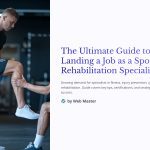 With the growing focus on fitness, injury prevention, and rehabilitation, the demand for sports rehabilitation specialists has never been higher. However, breaking into this field requires more than just a degree. To successfully land a job, candidates must have specialized knowledge, practical experience, and a strategic approach to job hunting. This guide covers key tips, necessary certifications, and career-boosting strategies to help you succeed in the competitive sports rehabilitation industry.
With the growing focus on fitness, injury prevention, and rehabilitation, the demand for sports rehabilitation specialists has never been higher. However, breaking into this field requires more than just a degree. To successfully land a job, candidates must have specialized knowledge, practical experience, and a strategic approach to job hunting. This guide covers key tips, necessary certifications, and career-boosting strategies to help you succeed in the competitive sports rehabilitation industry.

Understanding the Role of a Sports Rehabilitation Specialist
A sports rehabilitation specialist helps athletes and individuals recover from injuries, prevent future issues, and improve overall physical performance. They work closely with physiotherapists, athletic trainers, and sports medicine professionals to create customized recovery programs.
Key responsibilities include:
- Assessing injuries and creating rehabilitation plans.
- Implementing strength and conditioning programs.
- Utilizing techniques like massage therapy, stretching, and hydrotherapy.
- Collaborating with coaches and healthcare professionals for injury prevention.
To succeed in this role, one must have a deep understanding of human anatomy, biomechanics, and the latest rehabilitation techniques. A passion for sports and helping people regain mobility is also essential.

Required Education and Certifications for Success
A degree in a related field is typically required to become a sports rehabilitation specialist. Common fields of study include:
- Sports Science
- Physical Therapy
- Kinesiology
- Exercise Physiology
In addition to a degree, obtaining certifications can significantly boost job prospects. Some of the most recognized certifications include:
- Certified Strength and Conditioning Specialist (CSCS)
- Certified Athletic Trainer (ATC)
- Physical Therapy License (DPT)
- Corrective Exercise Specialist (CES)
- Performance Enhancement Specialist (PES)
Certifications not only enhance credibility but also show commitment to the profession, making candidates more attractive to employers.

Gaining Practical Experience to Stand Out
Employers look for candidates with hands-on experience. Here’s how you can gain practical exposure:
- Internships & Volunteer Work: Working with sports teams, rehabilitation clinics, or fitness centers provides valuable real-world experience.
- Shadowing Professionals: Observing experienced rehabilitation specialists helps in understanding industry standards and techniques.
- Personal Projects: Assisting local athletes, fitness trainers, or community members in recovery can demonstrate skills and passion.
- Research & Workshops: Attending industry workshops and staying updated on the latest rehabilitation techniques showcases continuous learning.
Real-world experience makes a significant difference when applying for jobs, as employers prefer candidates who can immediately contribute without extensive training.

Building a Strong Professional Network
Networking is crucial in the sports rehabilitation field. Consider these steps to build meaningful connections:
- Join Professional Associations: Organizations like the National Athletic Trainers’ Association (NATA) or the American Physical Therapy Association (APTA) provide networking opportunities.
- Attend Industry Events: Conferences, workshops, and seminars allow direct interaction with potential employers.
- Utilize LinkedIn: Connecting with professionals, following industry leaders, and engaging in discussions can open job opportunities.
- Engage with Local Sports Teams: Many teams need rehabilitation support, and volunteering can lead to job offers.
Networking not only helps in finding job openings but also provides mentorship opportunities to advance your career.

Crafting an Impressive Resume and Cover Letter
A well-structured resume and cover letter can make all the difference. Here are key elements to include:
Resume:
- Clear, professional layout.
- Education and certifications.
- Relevant experience (internships, clinical rotations, research).
- Skills such as injury assessment, rehabilitation techniques, and program development.
- Achievements like successful rehabilitation cases or athlete recovery statistics.
Cover Letter:
- Highlight passion for sports rehabilitation.
- Explain why you are the best fit for the position.
- Mention specific skills and experiences that align with the job.
- End with a strong call to action, requesting an interview.
Tailoring applications for each job instead of using generic resumes increases the chances of securing an interview.

Finding and Applying for Job Opportunities
Knowing where to look for jobs is just as important as having the right qualifications. Here are some effective job-hunting strategies:
- Online Job Portals: Websites like Indeed, Glassdoor, and LinkedIn frequently list sports rehabilitation jobs.
- University Career Services: Many educational institutions offer job placement assistance.
- Company Websites: Directly applying through sports clinics, rehabilitation centers, and fitness organizations often yields better results.
- Cold Outreach: Contacting sports teams, gyms, and rehabilitation centers proactively can open doors to hidden job opportunities.
- Freelancing: Some specialists work independently with athletes or teams, gaining experience while building a reputation.
Actively applying and networking significantly increases the likelihood of securing a position in the industry.
Conclusion
Becoming a successful sports rehabilitation specialist requires more than just academic knowledge. Practical experience, networking, certifications, and strategic job searching are key factors that determine career success. By following these steps, aspiring professionals can maximize their chances of landing a rewarding job in this dynamic and growing field.
Q&A
What is the average salary of a sports rehabilitation specialist?
Salaries vary based on location, experience, and specialization. On average, sports rehabilitation specialists earn between $45,000 and $85,000 annually.
Can I become a sports rehabilitation specialist without a degree?
While a degree is highly recommended, some roles accept certifications and extensive hands-on experience.
How long does it take to become a certified specialist?
It depends on the program. A bachelor’s degree typically takes 4 years, and certifications can take a few months to a year.
Is freelancing a good option for sports rehabilitation specialists?
Yes! Many specialists work independently with athletes, fitness centers, and teams, offering rehabilitation services on a contract basis.
What are the best locations to work as a sports rehabilitation specialist?
Cities with strong sports industries, such as Los Angeles, New York, and London, offer more job opportunities.
*Capturing unauthorized images is prohibited*



